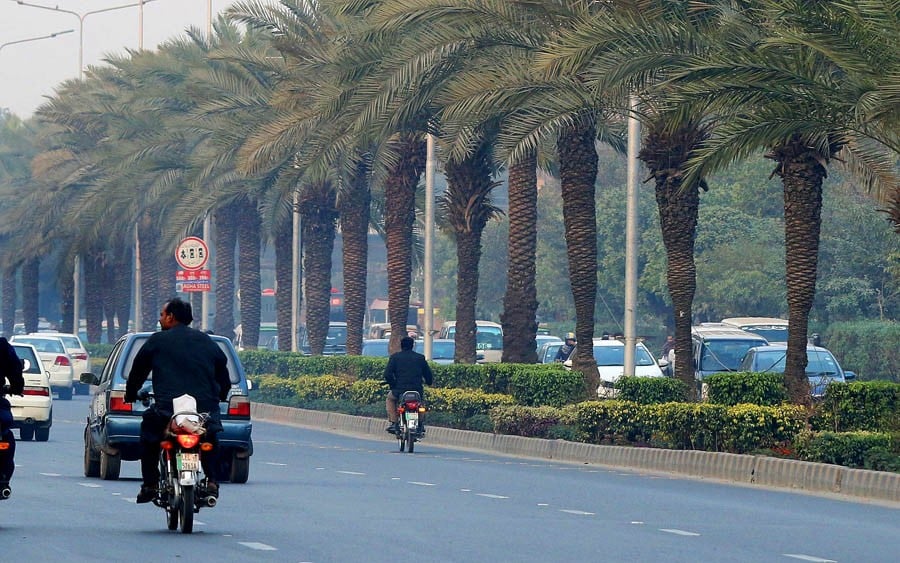
The provincial capital has been divested of hundreds of native trees, which are being replaced by those of largely ornamental value. Will the government authorities realise the value of trees?

For the past few years, Lahore has seen frenzied activity in the name of development and rapid urbanisation. As part of most projects, the provincial capital has been divested of hundreds of its native trees, including fruit trees, all of which have been replaced -- in what ought to be called an ill-advised government moot -- by ornamental trees, chiefly of date and palm variety.
The result is degradation of ecosystem and environment in a city already battling air pollution and smog.
Environment experts believe that planned landscapes and gardens are essential for a metropolitan city -- these make for eye-catching sights -- but, at the same time, these are not a true replacement of the indigenous trees.
Unfortunately, Lahore has become the biggest victim of this ‘trend’ in which expensive ornamental plants and trees are replacing the indigenous and far more environmentally friendly species such as Neem, Thraik, Jaaman, Mamgo, and Kikar.
Going around, you now find palm trees in the newly built greenbelts on Jail Road, Ferozpur Road, Khayaban-e-Jinnah, Azadi Chowk, Main Boulevard Johar Town, and many other localities. They have also been planted under the newly constructed flyovers as well as the Azadi Chowk.
As there is a lack of fruit trees, the city has also witnessed mass migration of exotic, small birds. Today, crows, pigeons and kites can only be seen flying about in the skies. They are losing their natural habitat.
In the recent past, the Lahore Development Authority (LDA) completed several road widening and remodeling projects. In a majority of cases, the Authority also preferred planting plants such as date and palm trees in collaboration with the Parks and Horticulture Authority (PHA).
Reportedly, the palm trees are imported from far East Asia -- chiefly Thailand, Malaysia, and Indonesia -- and supplied to the Punjab Horticulture Authority (PHA) by the Pakistan Society of Horticulture (PSH). A single tree eventually costs PHA between Rs30,000-50,000. The few date trees initially planted in parts of Jail Road have been imported from Dubai.
Environmentalists say the benefits of growing fruit trees or local species are plenty. Fruits trees grow well in urban areas and attract exotic or small birds, which add to the beauty of the city. Planting fruit trees is helpful also in creating a clean environment as it produces more oxygen than the ornamental trees do.
According to Ahmed Rafay Alam, an environmental lawyer and urban planner, Smog is one of the main problems now faced by the Lahorites every year around this time, and it can be helped if we plant native trees.
Alam tells TNS that carbon dioxide (CO2) is the greatest enemy of environment, and trees can help offset the effects of the gaseous pollution. "Trees, including fruit trees, actually need CO2 to survive. In other words, trees act as a cleaner or filter for the air, absorbing CO2 and injecting fresh oxygen into the atmosphere."
He says that even though by law there is no compulsion and the city developers can plant any type of trees, they should give preference to fruit trees and native species for the good of the environment.
Landscaping on greenbelts and around the roads, in the wake of different development projects, may have recreational advantage for commuters, but the environmentalists strongly advise planting native trees because the life span of ornamental trees is far less, in comparison.
Naseem-ur Rehman, the official spokesman of Environmental Protection Department (EPD), says the department has already given a free hand to the Parks & Horticulture Authority (PHA) and it is up to the latter to plant fruit and native trees. "Every public project has two tree plantation components -- one is landscaping and the other is tree plantation. The executing agencies are bound to do both the jobs. However, at several roads, only landscaping has been done, and plantation of trees remains pending.
"The EPD regularly issues notices to the executing agencies as well as the PHA to expedite implementation," Rehman asserts.
Director Headquarter and spokesman of PHA Tariq Shehzad rejects all such notions as baseless. He says, "The PHA gives preference to native trees. We’ve resisted plantation of ornamental trees since 2010."
He also claims that planting trees in the city is not the domain of the PHA. "Even then, we have launched various campaigns of tree plantations in the city."